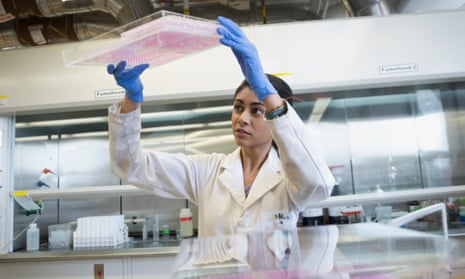Male scientists are more likely than female ones to publish work that describes itself as “excellent”, “unique” or “novel”, experts have found – a swagger that appears to reap dividends in respect of how often others reference the research.
The study suggests research papers in which the first and last authors were both women – positions typically taken by the junior researcher who did most of the work and the head of the research group, respectively – were on average more than 12% less likely to use at least one positive term to describe the research than papers for which the first author, last author or both were men.
This contrast was even starker, with a difference of more than 21%, when the team focused only on research papers published in the most prestigious journals.
Crucially, after taking into account a host of factors including gender, research published in prestigious medical journals was referenced in 13% more subsequent studies if it featured at least one glowing term.
The team say this matters as citations have an impact on salary, whether a researcher secures grants and whether they receive promotions – areas where there is a well-known gender gap in favour of men.
“A paper that is cited more often is going to be viewed by a promotions committee within a university as being more important than an article that is cited less often,” said Prof Anupam Jena, a co-author of the research from Harvard Medical School.
Writing in the BMJ, Jena and colleagues report that they analysed the titles and abstracts of 101,720 articles in the field of clinical research – such as drug trials or health studies – published between 2002 and 2017. The gender of the first and last author was determined using a name-based algorithm.
The team then searched these for 25 positive words, such as “robust”, “novel”, “remarkable” and “promising”.
For the more commonly used words such as “novel” or “promising”, there was a clear difference in usage based on the gender of the key authors. In the case of “novel”, the proportion of articles using the word was 59% greater for papers where either or both of the first and last authors were men than where both were women. Overall, 10.9% of papers with women as both key authors used at least one of the 25 positive words in the title or abstract, compared with 12.2% of studies with male authors.The analysis took into account factors that could have affected the findings, such as the journal, field of research and year of publication.
Further analysis revealed that the finding was driven by differences in language among papers published in the most prestigious journals. The same trend was seen when the team looked at more than 6m papers in the life science field.
For both fields, the team found positive words were associated with a higher rate of subsequent citations.
Jena said there are probably many other examples of self-promotion that may differ between men and women, affecting careers. “This is just one lens into that phenomenon,” he said.
In a linked editorial, Prof Reshma Jagsi from the University of Michigan and Dr Julie Silver of Harvard Medical School called on journals to tackle bias, saying the system should be changed rather than expecting women to simply boast more. One suggestion is a set of standards on the use of positive terms.
They also call for research looking at whether positive terms are more likely to be removed in the editing process from studies by women. Heavy copyediting, they note, is more common in high-impact journals, where the new findings were most striking.
Helen Wollaston, the chief executive of Wise, a campaign for women in science and engineering, welcomed the study. “It just shows the power of language – these subtle things that can make a big impact,” she said, adding that training of scientists in the power of language whatever their gender could be important.
She said editors should be aware of subtle gender differences in how scientists described their work.
Prof Athene Donald, of the University of Cambridge, said there was a growing body of research showing editorial processes could be biased when it comes to gender.
“Here is another example when gender differences, probably imposed by unconscious cultural norms on both authors and editors, lead to divergent outcomes,” she said. “Because publishing itself has so much impact on career progression, this finding has significant implications. Academic processes and institutions need to pay much more attention to what gets published where, why and by whom.”
